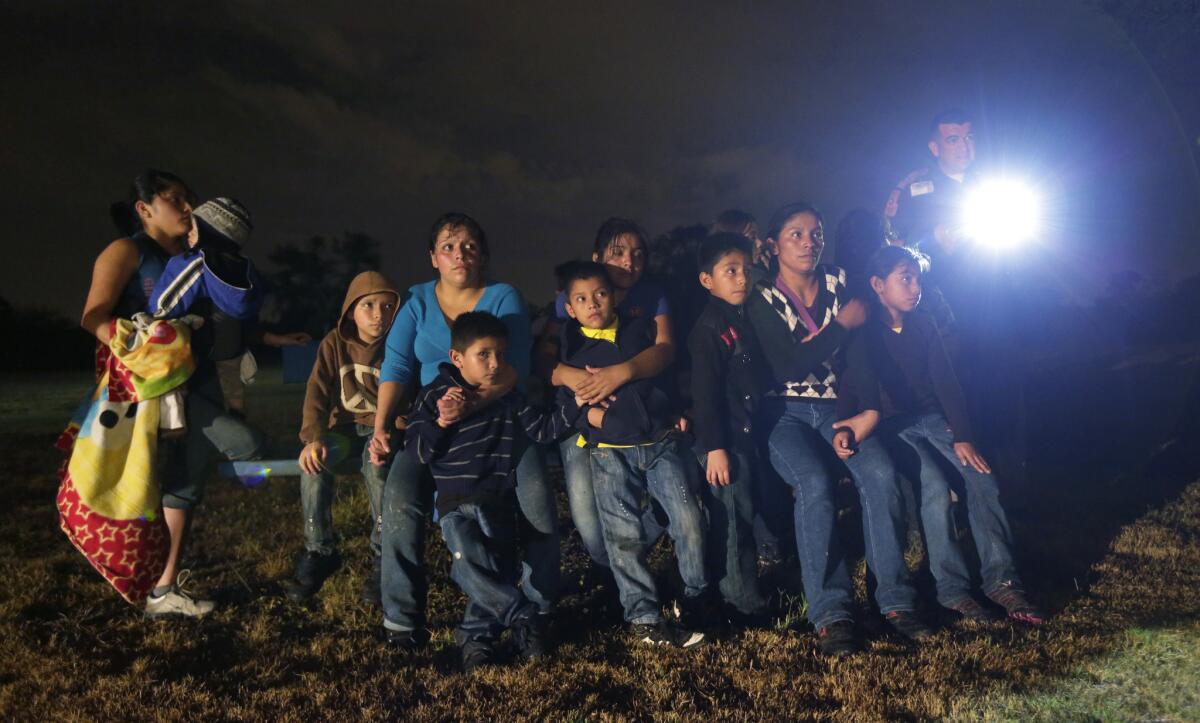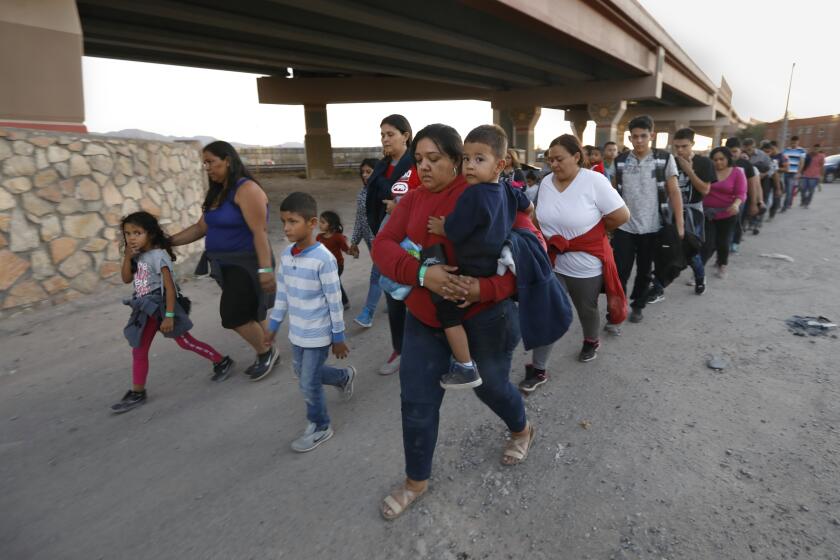California sues over Trump immigration policy on indefinite detention of migrant children

- Share via
SACRAMENTO — California opened another front in its legal battle with the Trump administration over immigration policies on Monday as officials announced a federal lawsuit challenging a new rule that allows indefinite detention of migrant children and their families.
The 19-state lawsuit, which was filed in the U.S. District Court for the Central District of California and is co-led by Massachusetts, was unveiled by Gov. Gavin Newsom and state Atty. Gen. Xavier Becerra, who criticized the president for ignoring a court settlement agreement that limited detention of children to 20 days.
“No child deserves to be left in conditions inappropriate and harmful for their age,” Becerra said Monday. “The actions by this administration are not just morally reprehensible, they’re illegal. Children don’t become subhuman simply because they are migrants.”
As the state with the largest immigrant population in the country, including an estimated 2.2 million people in the U.S. illegally, California officials have repeatedly clashed with Trump over his crackdown on migrants, including those seeking asylum.
The lawsuit is the 57th legal challenge filed by California against the Trump administration, 13 of which involve immigration policies, including a dispute over funding for a new border wall.
“If you go through the list, we’re reacting to this unprecedented assault on the rule of law and due process in this country,” Newsom said.
The Department of Homeland Security is moving to end a longstanding federal court agreement that limits how long immigrant children can be kept in detention.
Immigration issues have been a flashpoint between Trump and California. The administration sued the state in March 2018 to invalidate California’s sanctuary laws limiting law enforcement cooperation with immigration authorities, though a federal judge later sided with the state.
The latest legal action is over new regulations rolled out last week that will take effect in two months unless blocked by the courts. The states argue the rules undermine the Flores settlement of 1997, including the presumption that all children are eligible for release into the community.
Acting Homeland Security Secretary Kevin McAleenan said the Flores agreement, which was strengthened in 2015, was responsible for a flood of Central American families coming to the U.S. border and argued the new rules would discourage migration.
“The driving factor for this crisis is weakness in our legal framework for immigration,” McAleenan said last week. “This single settlement has substantially caused, and continues to fuel, the current family unit crisis ... until today.”
More than 760,000 people have apprehended by the Border Patrol this fiscal year as of July, a 92% increase over last year with two months left in fiscal year 2019.
Trump said last week that the policy change was being made on humanitarian grounds.
“Very much I have the children on my mind. It bothers me very greatly,” the president told reporters at the White House. “When they see you can’t get into the United States ... they won’t come. And many people will be saved. Many women’s lives will not be destroyed.”
Newsom told reporters at a morning news conference at the state Department of Justice on Monday that the suggestion that Trump is acting on behalf of children is “laughable and ludicrous.”
“The policies of this administration are exacerbating the early childhood trauma of young children, seven, by the way, who have lost their lives,” Newsom said.
The lawsuit announced Monday argues that the new policy interferes with the states’ ability to help ensure the health, safety and welfare of children by undermining state licensing requirements for facilities where children are held. The complaint also says the Trump administration rule will result in the vast expansion of family detention centers, which are not state-licensed facilities and have been found to cause increased trauma in children.
The lawsuit says the rule will lead to prolonged detention for children, with significant long-term negative health consequences.
The new policy also violates the due process clause of the 5th Amendment to the U.S. Constitution, the states argue.
Immigration and Customs Enforcement shut down a real hotline for detained immigrants run by the California group Freedom for Immigrants less than two weeks after it was prominently featured on the show.
The state officials say the regulations remove protections guaranteed by the Flores settlement, which was the result of a class-action lawsuit filed in federal court in California alleging substandard conditions of confinement for unaccompanied immigrant children.
That lawsuit, named for migrant Jenny Lisette Flores, ended up with the U.S. Supreme Court before federal officials agreed to a settlement in 1997. The agreement required children be released “without unnecessary delay” to their parents, legal guardians, individuals designated by the parents or a licensed program willing to accept custody, Becerra said.
“It’s an assault on the Flores decision,” Newsom said last week in an interview on CNN.
“Clearly, I think it will be rejected by the courts,” the governor said, adding that “California will once again assert itself in the court of law.”
One legal expert raised doubts about California’s case.
Congress has delegated power over immigration policy to the president, said Robert Pushaw, a law professor at Pepperdine University, who added that federal law preempts state law, including the states’ “police power” to protect public health, safety and welfare.
Pushaw said that unless the new rule does not comply with administrative procedures for changing regulations, “the states’ lawsuit will probably fail if it gets to the U.S. Supreme Court.”
However, he added, “it is entirely possible that a lower federal court will give the states a temporary victory, perhaps by holding that the Trump administration is depriving the immigrant children of liberty without first affording them due process of law.”
The lawsuit filed Monday came a month after California and other states went to court over concerns that children were being held for weeks without access to basic necessities such as soap, clean water, toothbrushes, showers or a place to sleep, Becerra noted.
Also part of the latest lawsuit are the District of Columbia and 18 other states in addition to California: Massachusetts, Connecticut, Delaware, Illinois, Maine, Maryland, Michigan, Minnesota, Nevada, New Jersey, New Mexico, New York, Oregon, Pennsylvania, Rhode Island, Vermont, Virginia and Washington.
A spokesman for the Federation for American Immigration Reform, which advocates for tougher enforcement, said the states’ lawsuit is without merit.
“This case appears to be yet another attempt by the open-borders lobby and the anti-Trump contingent to find activist judges in federal district courts who are willing to engage in all manner of inappropriate judicial gymnastics in order to furnish foreign nationals with all kinds of ‘rights’ that neither the Constitution, nor any federal statutes, actually confer upon them,” said Matthew J. O’Brien, director of research for the group.
Becerra also announced Monday that he filed for a preliminary injunction to put on hold a new “public charge” rule that could deny green cards to immigrants who receive public assistance, including food stamps, Medicaid and housing vouchers.
California’s record in suing Trump on immigration issues has been mixed. The state previously won an injunction to block the end of a program that defers deportation for immigrants brought to the U.S. as children. California is also appealing a court decision against state efforts to block construction of a border wall.
The Trump administration dropped its plan to ask a citizenship question on the U.S. census after California sued.
More to Read
Sign up for Essential California
The most important California stories and recommendations in your inbox every morning.
You may occasionally receive promotional content from the Los Angeles Times.













